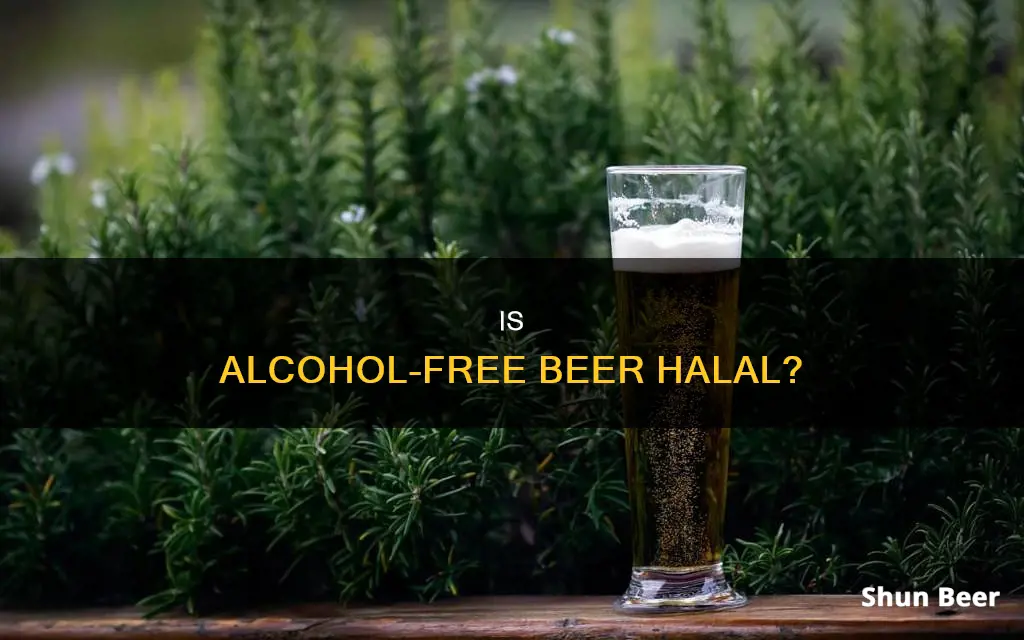
Drinking alcohol is forbidden in Islam. Islamic scholars and Muslim religious authorities cite a verse in the Quran that calls intoxicants the work of Satan and instruct believers to avoid them. There is debate, however, about whether Muslims can drink non-alcoholic beer. Some argue that non-alcoholic beer is haram because it is produced in the same way as regular beer, and because the process of removing alcohol from the drink is never 100% effective. Others argue that non-alcoholic beer is permissible because it does not intoxicate the drinker.
| Characteristics | Values |
|---|---|
| Alcohol content | Non-alcoholic beer may contain a minuscule amount of alcohol |
| Legality in Islam | There is no clear consensus on whether non-alcoholic beer is halal or haram |
| Legality in Qatar | Non-alcoholic beer is available in Qatar, but alcoholic beer is banned |
What You'll Learn
- Drinking alcohol is haram in Islam
- Non-alcoholic beer may still contain traces of alcohol
- The Islamic principle states that if a whole thing is haram, then a part of it is also haram
- The culture of drinking wine and beer is non-Islamic and therefore haram
- Some scholars say that non-intoxicating beer is permissible

Drinking alcohol is haram in Islam
Drinking alcohol is considered haram, or forbidden, in Islam. Islamic scholars and Muslim religious authorities point to a verse in the Quran that calls intoxicants "the work of Satan" and tells believers to avoid them. This is supported by sayings of Prophet Muhammad and the negative effects that alcohol can have.
The Prophet (peace and blessings of Allah be upon him) said: "Every intoxicant is khamr and every intoxicant is haram." It is haram to drink a lot or a little, even a single drop, because the Prophet (peace and blessings of Allah be upon him) also said: "Whatever intoxicates in large quantities, a little of it is haram."
The Islamic principle is that if a whole thing is haram, then a part of it is also haram. This means that non-alcoholic beers and wines are also haram because they are produced in the same way as their alcoholic counterparts, and because a culture of drinking wine and beer is non-Islamic and therefore haram.
However, some scholars argue that non-alcoholic beer is permissible because it is completely free of alcohol or contains only a minuscule amount that does not cause intoxication. They argue that the basic principle is that all food and drink are permissible until proof is established that they are haram.
Some Muslims choose to abstain from non-alcoholic beer because of the doubt surrounding its permissibility. Others choose to abstain because they believe that the intention behind drinking it is to imitate drinkers of alcohol, which goes against the teaching of Islam.
Beer and GERD: What You Need to Know
You may want to see also

Non-alcoholic beer may still contain traces of alcohol
The consumption of non-alcoholic beer is a topic of debate among Muslims, with some scholars arguing that it is permissible, while others consider it prohibited. The key factor in this discussion is the presence of even minuscule amounts of alcohol in non-alcoholic beverages.
Non-alcoholic beer is produced by removing alcohol from regular beer, but this process does not always eliminate 100% of the alcohol content. While some non-alcoholic beers claim to have 0.0% ABV, studies have found that many of these beverages contain higher levels of alcohol than indicated on their labels. This discrepancy can be attributed to the fact that by law, non-alcoholic beers can contain up to 0.5% alcohol by volume (ABV). This means that even if a product is labelled as having 0.0% ABV, it may still contain traces of alcohol.
The Islamic Religious Council of Singapore has stated that non-alcoholic beer is haram, as the process of making alcoholic and non-alcoholic beer is the same. They argue that even if the alcohol is extracted, it is never completely removed, and the culture of beer drinking is non-Islamic. However, other scholars have a different view, differentiating between intoxicating and non-intoxicating beer. They argue that non-intoxicating beer, which contains a minuscule amount of alcohol that does not lead to intoxication, is permissible. This is based on the principle that if something contains a percentage of alcohol that does not cause intoxication, it is not considered haram.
The presence of traces of alcohol in non-alcoholic beer has important implications for certain groups of people, including those with alcohol use disorders, pregnant individuals, and those trying to become pregnant. For these individuals, even small amounts of alcohol can be harmful, and the smell and taste of non-alcoholic beer may trigger cravings and increase the risk of relapse.
While non-alcoholic beer may be a suitable alternative for some people looking to reduce their alcohol intake, it is essential to be aware of the potential risks associated with its consumption. The label claims and regulations regarding alcohol content in these beverages should be carefully considered before making a decision about their consumption.
Prison Beer Drinking: Is it Possible?
You may want to see also

The Islamic principle states that if a whole thing is haram, then a part of it is also haram
This principle is often applied to the question of whether Muslims can drink non-alcoholic beer. Non-alcoholic beer is made using the same process as alcoholic beer, and alcohol is extracted from it after production. However, it is rare for 100% of the alcohol to be removed. Therefore, by the Islamic principle, non-alcoholic beer is considered haram, as it is a part of something that is wholly haram.
Additionally, non-alcoholic beer is often drunk as an alternative to alcoholic beer, which is considered haram in Islam. The culture of drinking beer is seen as non-Islamic and, therefore, haram. Thus, non-alcoholic beer is also haram by association and by the principle that if a whole thing is haram, then a part of it is also haram.
It is important to differentiate between intoxicating and non-intoxicating beverages. Intoxicating beverages, such as alcoholic beer, are considered haram in Islam. On the other hand, non-intoxicating beverages that are completely free of alcohol or contain a minuscule amount of alcohol that does not cause intoxication are generally considered halal or permissible. However, when it comes to non-alcoholic beer, the Islamic principle of "if a whole thing is haram, then a part of it is also haram" takes precedence, and it is considered haram due to its association with alcoholic beer and the presence of residual alcohol.
It is worth noting that there may be differing opinions among Muslim scholars and individuals regarding the permissibility of non-alcoholic beer. Some may argue that if the alcohol content is minimal and does not cause intoxication, it may be permissible. However, the principle of "if a whole thing is haram, then a part of it is also haram" provides a clear guideline for Muslims to follow, and in this case, it deems non-alcoholic beer as haram.
Beer and Keto: What You Need to Know
You may want to see also

The culture of drinking wine and beer is non-Islamic and therefore haram
The consumption of wine and beer is deeply rooted in numerous societies and cultures worldwide, with evidence of ancient practices of brewing and fermentation dating back to the Neolithic era. While the production and consumption of these beverages have evolved over time, with many countries developing their own unique traditions and cultures around alcohol, the act of drinking remains a significant social and recreational activity.
However, when viewed through the lens of Islamic teachings, the culture of drinking wine and beer is considered non-Islamic and, therefore, haram. This perspective is based on several principles outlined in Islamic jurisprudence. Firstly, according to the Islamic Religious Council of Singapore, the process of making non-alcoholic and alcoholic beers and wines is the same. As a result, even if the alcohol is later extracted, the final product is still considered haram because the whole of a thing and its parts are deemed impermissible.
Secondly, the culture of drinking wine and beer is seen as a non-Islamic practice. The act of consuming these beverages, regardless of their alcohol content, is viewed as an alternative to something that is explicitly forbidden in Islam, which is the consumption of alcoholic drinks. This is further supported by the Prophet's (peace and blessings of Allah be upon him) statement, "Every intoxicant is khamr, and every intoxicant is haram."
Moreover, the culture of drinking wine and beer is often associated with social behaviours and traditions that may contradict Islamic values. For instance, in many Western societies, drinking is a common practice during celebrations or social gatherings, with alcoholic drinks being served to mark special occasions. While this may be considered a harmless social activity by some, Islam places great emphasis on avoiding intoxication and its potential negative consequences, as stated by the Prophet: "Whatever intoxicates in large quantities, a little of it is haram."
Furthermore, the consumption of wine and beer can lead to excessive drinking or alcoholism, which is prohibited in Islam. Excessive drinking has been linked to various health risks and social issues, including liver disease, cardiovascular problems, addiction, and even sudden death. As a result, Islamic countries have low rates of alcohol consumption, and it is completely banned or strictly controlled in many of these nations.
In conclusion, the culture of drinking wine and beer is considered non-Islamic due to the process of production, the intention of consumption, the potential for intoxication, and the associated social behaviours. Therefore, Muslims are advised to refrain from partaking in this culture and instead seek alternative, permissible beverages that align with Islamic teachings and values.
Wine and Beer: Mixing Alcoholic Drinks, Safe or Not?
You may want to see also

Some scholars say that non-intoxicating beer is permissible
The consumption of alcohol is considered haram, or forbidden, in Islam. Islamic scholars and Muslim religious authorities typically cite a verse in the Quran that calls intoxicants "the work of Satan" and instructs believers to avoid them. Additionally, they refer to the sayings of Prophet Muhammad and the negative effects that alcohol can have.
However, the question of whether non-alcoholic or 0% alcohol beer is permissible for Muslims is more complex and has been the subject of debate among scholars. Some scholars argue that non-alcoholic beer is permissible because it is completely free of alcohol or contains only a minuscule amount that does not cause intoxication. This view is based on the interpretation that the prohibition of alcohol in Islam specifically refers to intoxicating substances.
For example, Shaykh Ibn 'Uthaymin stated that the beer sold in Saudi Arabian marketplaces is halal because it has been inspected and found to be free of alcohol. He emphasised the principle that all food, drink, and clothing are permissible unless proven to be haram. In this case, the absence of intoxicating properties in non-alcoholic beer means it does not fall under the category of forbidden substances.
Furthermore, proponents of this view argue that many other foods and drinks, such as bread and fruit juices, naturally contain trace amounts of alcohol due to fermentation, yet they are not considered haram. Therefore, as long as the alcohol content in non-alcoholic beer is insignificant and does not lead to intoxication, it can be considered permissible.
However, it is important to note that there are differing opinions among scholars and Muslims regarding this issue. Some argue that the process of making non-alcoholic beer is the same as that of regular beer, and since regular beer is haram, non-alcoholic beer should also be avoided. Additionally, some Muslims may choose to abstain from non-alcoholic beer due to the drinking culture associated with it, which may be considered non-Islamic.
Beer and Sinus Infections: Is It Safe to Drink?
You may want to see also
Frequently asked questions
There is no clear consensus on whether Muslims can drink 0% alcohol beer. Some scholars argue that drinking non-alcoholic beer is haram because it is produced in the same way as regular beer, and the process of making alcoholic and non-alcoholic beer is haram. Others argue that non-alcoholic beer is permissible because it contains only a minuscule amount of alcohol that does not cause intoxication.
Drinking alcohol is considered haram, or forbidden, in Islam. Islamic scholars and Muslim religious authorities typically cite a verse in the Quran that calls intoxicants "the work of Satan" and tells believers to avoid them.
While the prohibition of alcohol in Islam is widely followed, not all Muslims abstain from drinking. Some drink privately or publicly. A Pew Research Center survey found that most Muslims surveyed believed that drinking alcohol was morally wrong, with more than half in all countries holding this view. However, in 11 out of 37 countries, at least 10% said that consuming alcohol is morally acceptable.







